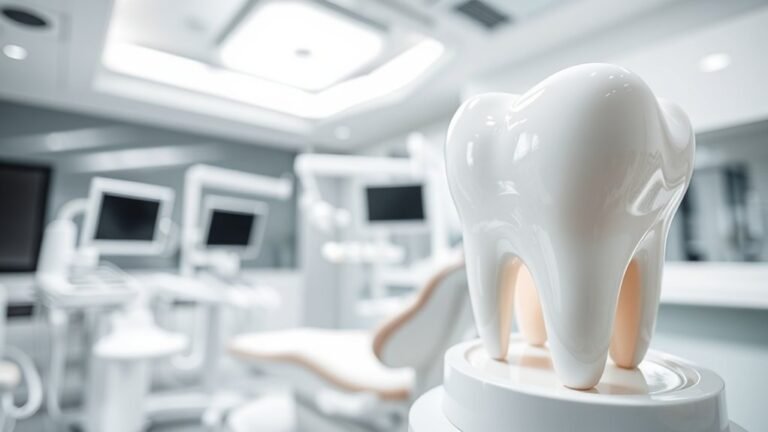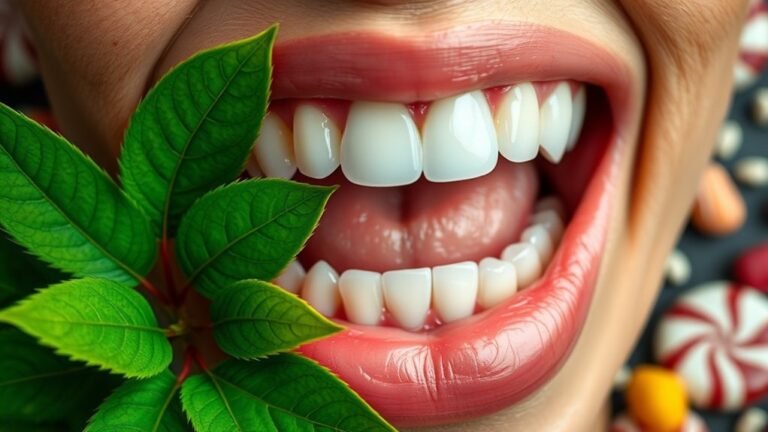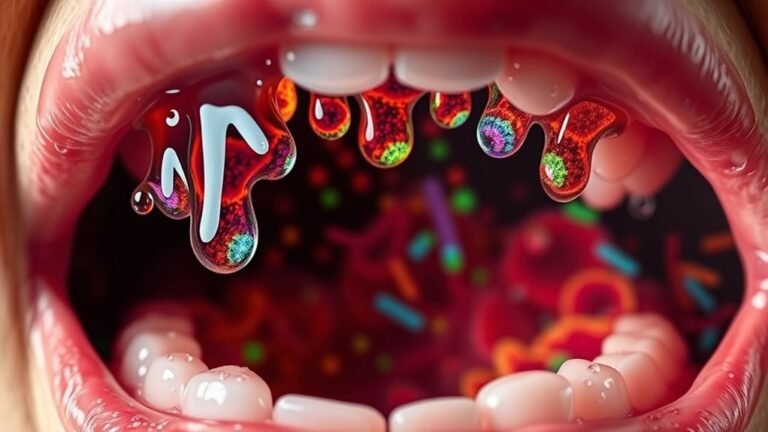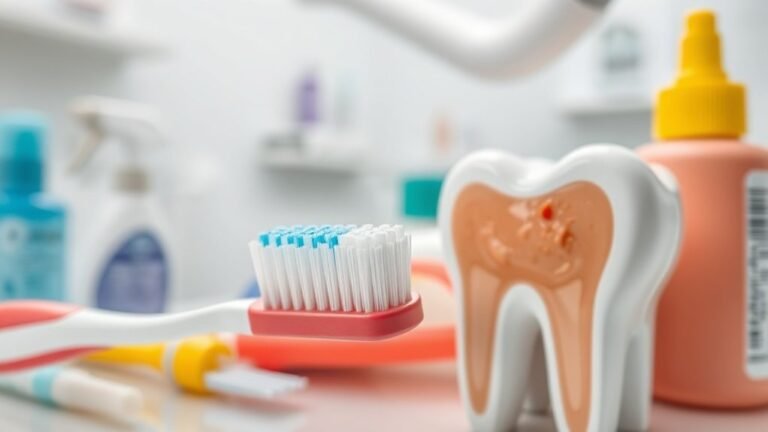How Can Oral Probiotics Restore Healthy Microbial Balance and Stop Infections
Oral probiotics can restore healthy microbial balance by introducing beneficial bacteria that compete with harmful pathogens in your mouth. These probiotics produce antimicrobial substances, inhibit growth of cavity-causing bacteria, and enhance your immune response, helping to reduce infections. Regularly consuming specific strains can effectively improve gum health and freshen your breath. As you explore more about oral probiotics, you’ll uncover additional ways they can boost your overall dental health and well-being.
Key Takeaways
- Oral probiotics compete with harmful bacteria, reducing their presence and establishing a healthier microbial balance in the mouth.
- They produce antimicrobial substances that inhibit the growth of pathogens linked to infections and gum diseases.
- Regular intake of probiotics fosters a resilient oral microbiome, preventing dysbiosis and promoting overall oral health.
- Probiotics enhance immune responses, reducing inflammation and lowering the risk of infections in the oral cavity.
- Incorporating specific probiotic strains can target gum disease-related pathogens, supporting gum health and preventing cavities.
Understanding Oral Probiotics: What Are They?
What exactly are oral probiotics, and how do they function? Oral probiotics are live microorganisms, primarily beneficial bacteria, designed to enhance your oral microbiome. When you consume these probiotics, they interact with your existing oral flora, promoting a balance between beneficial and harmful bacteria. This balance is essential for maintaining oral health, as beneficial bacteria can inhibit the growth of pathogens that cause cavities and gum disease. Research supports that specific strains, such as Lactobacillus and Bifidobacterium, can effectively reduce harmful bacterial levels while promoting overall oral health. By incorporating oral probiotics into your routine, you’re not just supporting your gut health; you’re actively fostering a healthier mouth environment conducive to preventing infections and maintaining a balanced microbiome.
The Role of the Oral Microbiome in Health
While many people may overlook the oral microbiome, it plays a critical role in overall health, influencing not just dental hygiene but also systemic conditions. The oral microbiome comprises diverse bacteria that contribute to immune support, helping your body fend off infections and diseases. A balanced oral microbiome can prevent the overgrowth of harmful pathogens, which are linked to conditions like cardiovascular disease and diabetes. Research indicates that maintaining a healthy oral microbiome promotes better digestion and enhances your body’s ability to absorb nutrients. By fostering a diverse microbial community in your mouth, you’re not only protecting your teeth and gums but also supporting your overall well-being and resilience against various health challenges.
How Oral Probiotics Work to Restore Balance
Maintaining a balanced oral microbiome is where oral probiotics come into play, offering a targeted approach to restoring microbial harmony. These beneficial bacteria work by competing with harmful pathogens for resources and attachment sites in your mouth. By doing so, they help reduce the abundance of harmful microbes that can lead to infections and oral health issues. Oral probiotics also produce antimicrobial substances, further inhibiting the growth of pathogenic bacteria. Research indicates that regular consumption of specific probiotic strains can positively influence microbial balance, enhancing your overall oral health. By fostering a diverse and stable microbiome, you promote resilience against dysbiosis, ensuring your mouth remains a healthy environment for beneficial bacteria to thrive.
Benefits of Oral Probiotics for Dental Health
Oral probiotics offer a multitude of benefits for dental health, greatly enhancing your oral hygiene routine. By introducing beneficial commensal bacteria into your mouth, these oral health supplements help maintain a balanced microbial environment. This balance can combat harmful bacteria that lead to gum disease and bad breath.
| Benefit | Description | Emotional Impact |
|---|---|---|
| Improved Gum Health | Reduces inflammation and promotes healing | Confidence in smiles |
| Fresh Breath | Fights odor-causing bacteria | Enhanced social interactions |
| Reduced Cavities Risk | Inhibits harmful bacteria growth | Peace of mind |
| Stronger Immune Response | Strengthens oral defenses | Overall well-being |
Incorporating oral probiotics can greatly elevate your dental health, making your smile not just brighter but also healthier.
Preventing Cavities With Oral Probiotics
Oral probiotics play a vital role in maintaining oral health by balancing harmful bacteria that contribute to cavities. Research shows that specific strains can inhibit cavity-causing bacteria, effectively reducing the risk of tooth decay. Understanding the mechanisms behind this protective effect can empower you to make informed choices for your dental care.
Probiotics and Oral Health
While many focus on traditional dental care methods, incorporating probiotics into your routine can greatly impact oral health by preventing cavities. Research shows that specific probiotic strains, such as Lactobacillus and Bifidobacterium, can enhance microbial diversity in your mouth. This diversity is essential as it helps maintain a balanced oral microbiome, reducing the prevalence of harmful bacteria that contribute to tooth decay. By fostering beneficial bacteria, probiotics can inhibit the growth of cavity-causing pathogens, leading to improved oral health outcomes. Regular use of oral probiotics not only supports cavity prevention but also promotes overall gum health, making it a valuable addition to your dental hygiene practices. Consider integrating these probiotics for lasting benefits.
Mechanism Against Cavities
Probiotics play a significant role in combating cavities by directly influencing the oral microbiome’s composition and activity. They achieve this through bacteria modulation, which helps maintain a balance between harmful and beneficial bacteria. By promoting the growth of protective strains, probiotics can inhibit cavity-causing bacteria like Streptococcus mutans. This competitive inhibition is essential for cavity prevention, as it reduces the overall acid production that leads to tooth decay.
| Mechanism | Probiotic Action | Effect on Cavities |
|---|---|---|
| Bacteria Modulation | Increases beneficial bacteria | Reduces harmful bacteria |
| Biofilm Formation | Enhances protective layers | Shields teeth from decay |
| pH Balance | Lowers acidity | Prevents enamel erosion |
| Immune Response | Stimulates local immunity | Fights off pathogens |
| Nutrient Absorption | Improves mineral uptake | Strengthens tooth structure |
Clinical Research Insights
Recent studies shed light on the effectiveness of oral probiotics in preventing cavities, demonstrating their potential to transform dental health. Research indicates that specific strains of probiotics can positively influence oral flora, promoting a balanced microbial ecosystem. By enhancing mucosal immunity, these probiotics help fend off harmful bacteria responsible for tooth decay. For instance, clinical trials show that individuals using oral probiotics experience a significant reduction in cavity-causing bacteria like Streptococcus mutans. Additionally, these probiotics may inhibit biofilm formation, further protecting against dental caries. As you consider incorporating oral probiotics into your routine, remember that their role in maintaining a healthy oral environment could be a game-changer for your long-term dental health.
The Impact of Oral Probiotics on Gum Disease
Oral probiotics play an essential role in maintaining gum health by balancing the oral microbiome. Research shows that specific strains can inhibit pathogens responsible for gum disease, thereby reducing inflammation and promoting healing. Understanding these mechanisms can empower you to enhance your oral care routine effectively.
Probiotics and Gum Health
As you explore the link between gut health and overall wellness, you might be surprised to learn how directly this connection extends to your oral health, particularly gum health. Oral probiotics play a significant role in combating periodontal disease and enhancing infection prevention. They help maintain a balanced oral microbiome, which is essential for gum health. Here are four ways probiotics can benefit your gums:
- Reduce harmful bacteria associated with gum disease.
- Promote healthy bacterial growth that supports gum tissue.
- Enhance the immune response in the oral cavity.
- Decrease inflammation linked to periodontal issues.
Mechanisms Against Infections
When considering the role of probiotics in oral health, it’s crucial to understand how these beneficial microorganisms combat gum disease. Probiotics contribute to biofilm control by outcompeting harmful bacteria for adhesion sites on gum tissues. This competitive exclusion not only disrupts the establishment of pathogenic biofilms but also enhances the stability of healthy microbial communities. In addition, probiotics promote pathogen suppression by producing antimicrobial compounds, such as bacteriocins and hydrogen peroxide, which inhibit the growth of disease-causing organisms. Research indicates that specific strains, like Lactobacillus and Streptococcus, effectively reduce inflammation and improve clinical outcomes in gum disease. By fostering a balanced oral microbiome, probiotics can greatly mitigate the risk of gum infections and support overall oral health.
Combating Bad Breath With Probiotic Solutions
While many people associate bad breath solely with poor oral hygiene, research indicates that an imbalance in the oral microbiome can greatly contribute to this issue. Probiotics can serve as a powerful tool for breath freshening by restoring this balance. Here’s how they help:
- Reduce harmful bacteria: Probiotics outcompete the bacteria responsible for bad breath.
- Enhance saliva production: Increased saliva helps wash away food particles and bacteria.
- Support oral health: A balanced microbiome can lower the risk of oral infections that contribute to halitosis.
- Improve overall microbial diversity: A diverse microbiome can maintain a healthier mouth environment.
Incorporating oral probiotics into your routine can be an effective strategy for combating bad breath and promoting oral health.
Choosing the Right Oral Probiotic Supplement
How can you confirm you’re selecting the best oral probiotic supplement for your needs? It’s vital to evaluate factors like strain specificity, CFU count, and additional ingredients. Here’s a helpful comparison:
| Feature | Probiotic A |
|---|---|
| Strains | Lactobacillus, Bifidobacterium |
| CFU Count | 10 billion |
| Added Ingredients | Xylitol, Vitamin C |
| Dental Care Benefits | Reduces plaque, freshens breath |
Look for oral probiotics that target specific dental care issues, such as gingivitis or bad breath. Be certain the product has been clinically tested to guarantee effectiveness. Reading reviews and consulting with your dentist can also help you make an informed choice. Prioritize quality to effectively restore your oral microbial balance.
Integrating Probiotics Into Your Daily Routine
To successfully integrate probiotics into your daily routine, you should consider a systematic approach that aligns with your lifestyle and oral health goals. Regular use can enhance dental hygiene and support inflammation reduction, leading to better overall health.
- Choose the Right Time: Take probiotics at the same time daily, perhaps during breakfast, to create a habit.
- Combine with Dental Hygiene: Use oral probiotics after brushing to support microbial balance in your mouth.
- Pair with Healthy Diet: Complement probiotics with a diet rich in fiber and low in sugar for maximum effectiveness.
- Monitor Your Progress: Track any changes in your oral health and inflammation levels, adjusting your regimen as needed.
This structured approach can help you effectively incorporate probiotics for ideal benefits.
Future Research and Developments in Oral Probiotics
As you integrate probiotics into your daily routine, you might wonder about the future of oral probiotics and their potential impact on oral health. Ongoing research aims to uncover specific strains of oral probiotics that can effectively target oral pathogens, enhancing microbial balance. Scientists are also exploring the link between oral probiotics and systemic health, particularly how oral microbiome adjustments can influence overall well-being. Clinical trials may investigate the long-term benefits of these probiotics on conditions like gum disease and tooth decay. As you follow advancements in this field, stay informed about emerging formulations and delivery methods that enhance efficacy. The future promises a deeper understanding of how oral probiotics can serve as a preventive tool for both oral and systemic health.
Frequently Asked Questions
Can Children Safely Use Oral Probiotics?
Yes, children can safely use oral probiotics. Research shows they can support gut health and immunity. However, it’s vital to consult a pediatrician before starting any supplement to guarantee appropriateness and dosage for your child’s needs.
Are There Any Side Effects of Oral Probiotics?
Oral probiotics are generally safe, with only about 1-2% of users experiencing mild side effects like bloating or gas. Monitoring your body’s response can help you determine if they’re right for you.
How Long Does It Take to See Results From Oral Probiotics?
You’ll typically notice results from oral probiotics within one to four weeks, depending on the individual and specific health issues. Consistent use is key to achieving peak benefits and maintaining microbial balance over time.
Can Oral Probiotics Help With Bad Breath Caused by Medical Conditions?
Sure, you could say oral probiotics are like a breath mint for your mouth’s microbial ecosystem. They can help manage bad breath linked to medical conditions by balancing bacteria, promoting fresher breath and overall oral health.
Do Oral Probiotics Interact With Medications or Dental Treatments?
Oral probiotics generally don’t interact negatively with medications or dental treatments. However, it’s wise to consult your healthcare provider to guarantee compatibility, as individual responses may vary based on specific medications or health conditions.
Conclusion
Incorporating oral probiotics can greatly enhance your dental health, as studies show they can reduce harmful bacteria by up to 80%. With a balanced oral microbiome, you’re not just fighting bad breath and cavities; you’re actively promoting a healthier mouth. Choosing the right probiotic and integrating it into your daily routine could be the key to preventing infections and maintaining wellness. As research progresses, the potential benefits of oral probiotics will likely expand, offering even more solutions for ideal oral health.






